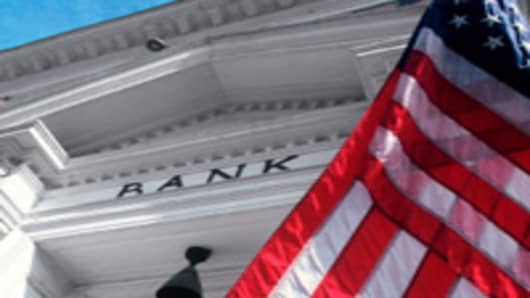US banks could become less competitive—and less profitable—from President Obama's proposed financial overhaul, analysts say.
As details of the sweeping plan emerged, there was worry among investors that the sector—which has been recovering in recent months from last year's financial crisis—could take another hit.
Among the biggest concerns: that increased regulation would reduce risk and leverage—which have been the main engines of growth in recent years.
"These regulations are so sweeping, so comprehensive and so expensive there's no question about the fact that they will lower the profitability of the industry," says Richard Bove, banking analyst with Rochdale Securities. "As part of these regulations there's a demand to increase capital almost consistently, which lowers the leverage of the bank and lowers its potential profitability."
While Wall Street had been expecting the administration to take a much stronger hand in regulating the financial sector after the subprime meltdown, the Obama plan still came as a surprise.
The proposal calls for tougher capital restrictions both for commercial banks and any business involved with financing. It also toughens regulations on the structured investment vehicles that many blame for creating the subprime mess and mortgage meltdown.
But analysts say the proposal faces months and possibly years of tough negotiations, with opposition not just from Capitol Hill but the banking industry and virtually any business connected to financing that would be touched by the new regulations.
The issues with the reform plan will extend beyond basic banking stocks and into companies like CNBC.com-parent General Electric , which has its own financing arm that now will be subject to the same capital requirements as banks.
"The administration is listening to its constituency and its constituency believes it has been badly harmed by a bunch of financiers who have not treated them fairly and they want something done about it," Bove says. "The president is going to do what the people want."
The questions over what lies ahead for the plan could create more headwinds for financial companies' stocks.
"Now here's another layer of uncertainty when we thought banks might have been able to see light at the end of the tunnel," says Kevin Mahn, portfolio manager for SmartGrowth Funds at Hennion and Walsh in Parsippany, N.J. "You could argue that there's only upside potential for a lot of these banks. But it's a question of who's going to survive and who's going to profit from all of this. Now we'll have to see."
A cloudy future that includes new regulations was one reason Standard & Poor's cut its rating on 18 major financial institutionsand reduced its outlook for four more.
S&P predicted increased volatility as the industry gets put through the regulatory wringer, a condition that will be exacerbated by more credit woes.
"Financial institutions are now shedding balance-sheet risk and altering funding profiles and strategies for the marketplace's new reality," S&P credit analyst Rodrigo Quintanilla wrote in a research note. "Such a transition period justifies lower ratings as industry players implement changes."
Some on Wall Street wondered whether the proposed changes for financials were a precursor to greater government control over the economy, especially in light of the Obama administration's aggressive moves into the automotive and health care industries.
"These regulations strike me as a floor not a ceiling," says Dave Lutz, managing director of trading at Stifel Nicolaus in Baltimore. "They're going to continue to over-regulate as they see fit and branching out from banks to everybody that has systemic presence in the marketplace."
The S&P downgrade hit the entire sector, sending the KBW Bank Index down more than 5 percent at one point before paring some of its losses. The SPDR Financial ETF also was lower as the market's general move higher was weighed by the heightened sense of insecurity about financials.
"This goes way beyond anything that anyone thought about in terms of how this regulation would occur," Bove says. "It's a magnificent piece of work if the goal at the end of the day is to create comprehensive regulation to establish greater safety and soundness in the system. It's a horrible piece of work if you don't want government intervention throughout the US economy and you don't want the cost of financial products to increase dramatically."
Bove predicts the negotiations over the plan could take two to three years and will leave the final law far different from the current proposal.
How the final product comes out, then, is likely to do much to determine the long-term view of bank stocks.
"You can see that the whole thrust of this thing is regulate, regulate, regulate," Bove says. "It's a massive increase in government and a massive increase in government control over the financial system and the economy. It's a democracy. People will decide what they want. I don't think they want this."



